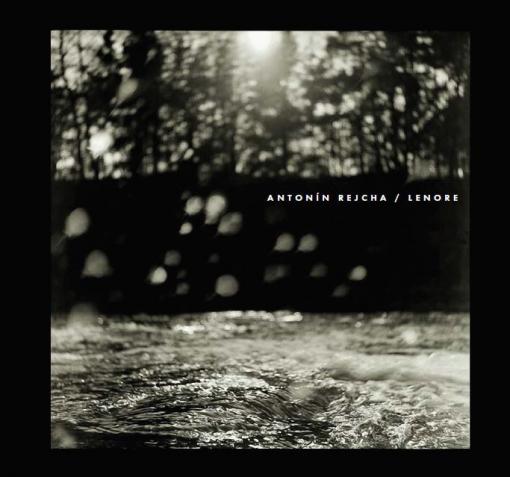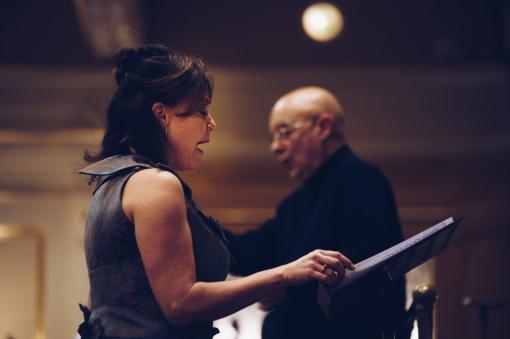In late 2020, the Brno Philharmonic released two recordings of works by Antonín Dvořák and Antonín Rejcha. We have already reviewed the “Dvořák” CD with the composer’s Symphony No. 1 and his Maličkosti (Bagatelles); the adaptation and instrumentation of the two works was provided by Dennis Russell Davies, the chief conductor of the orchestra. Now we are going to look at the recording of Lenore – a musical picture composed by Antonín Rejcha to the text of Gottfried August Bürger’s ballad of the same name. The CD features Martina Janková as Lenore, Pavla Vykopalová as Lenore’s mother, Wojciech Parchem as the narrator and Jiří Brückler as the late soldier William. The Czech Philharmonic Choir of Brno also performed side by side with the Brno Philharmonic Orchestra, led by Petr Fiala as the choir director. As with the recording of Antonín Dvořák´s works, this project was also directed by conductor Dennis Russell Davies.
Antonín Rejcha has been a neglected composer. Although musicians, dramatists and musicologists have realised the high quality of his work, his compositions have been rare to encounter in concert halls. Lenore, a composition which oscillates between a cantata and an oratorio, seems to materialise the disastrous fate of the composer’s legacy; while the work was never performed during the composer’s lifetime, it even had to wait until 1984 to see its premiere, when Stanislav Ondráček breathed new life into the masterpiece. This happened at the Rudolfinum Hall, Prague. After 180 years it was obvious that the story of Lenore and her lover, who returns to her as a zombie after she had waited for him, was a monumental, compositionally refined and, for that period, innovative work which, if performed in its time could have significantly influenced the development of artificial music. In our country, notably, this folk tale was adapted by Karel Jaromír Erben (Svatební košile; translates as The Wedding Shirt). It is the very composition that unites the artist’s perfect knowledge of forms and instrumentation, his humility towards the music of the older periods of style which infiltrates the musical stream at the thematic places, as well as his desire to treat traditional composition means with freshness and with unusual sound. Rejcha is a model of a composer who combined a far-sighted theorist with an unbridled Romantic-era artist – a man of practice with a man of discovery. Even if the recording of the Brno Philharmonic, for some reason, failed to achieve the highest qualities, it would deserve great recognition, if only as a dramaturgic pearl. Fortunately, even in terms of production and performance, the album presenting Rejcha’s Lenore is one of the recordings that artificial music enthusiasts should not miss.

Even the opening overture proves that the orchestra is in great form - the introductory Lenore’s pleasant sleep is performed with sweet and defenceless fragility. The melodies are sensitively phrased and, resembling the sleeping girl’s sounds as she exhales, enclosed into a subtle silence through decrescendo. On the other hand, nightmares roar in the maid’s sleep with increasing severity and inevitability, supported by sharp-cutting strings with faultless intonation. This interpretation precision of the orchestra and the sense of detail, both permeate the entire recording, and, along with Rejcha’s composition invention, the communicative ability and skill, form a clear emotional framework for the solo singers and the choir. Even in this respect, the recording has not much to complain about. In her title role, Martina Janková is gentle, charming and playful, as well as broken-hearted. Although her mother, in the interpretation of Pavla Vykopalová, only appears in a single duet in this piece of work, yet her heart-wrenching plea to God and her own daughter forms a fundamental turning point in the whole work and culminates in the inner tension of the composition. The tenor, Wojciech Parchem, as the narrator, must definitely be applauded for his expressive manifestation with which he interpreted the recitative plains nearing Bach’s approaches, as well as for sustaining his sense of variety of musical expression in the arias performed by the singer. Performing as William, Jiří Brückler showed off magnificent colour and an excellent skill of articulation with his ringing and unusually clear baritone. The choir performance of the Czech Philharmonic Choir of Brno, on the Brno Philharmonic´s CD with Rejcha´s Lenore, also holds an important position. While the ensemble excels in naturally live choir figures, it is even more impressive in those dynamically less extreme parts, more complex in terms of composition. One of the most interesting compositional peaks of this masterpiece can be found at the very beginning of the second part – with its eerie polyphony, the chorus Laßt uns den Leib begraben (We’ll Bury This Body) demonstrates not only the much more interesting face of the choir production, but also the broad possibilities of interpretation and expression of the Czech Philharmonic Choir of Brno.
In its new series of recordings introduced through the marketing motto “Music you can hardly buy anywhere else”, the Brno Philharmonic has released the Dvořák ´s CD and Rejcha’s Lenore so far. I am inclined to the opinion that while the new version of Dvořák’s Symphony No. 1 was not necessary, the Brno Philharmonic has done a great service to the musical world by introducing Rejcha’s Lenore on a music media. While recordings of Rejcha’s work do exist, they are far from as many as the composer’s musical genius would deserve. Let us hope that the recording of the Brno Philharmonic will set an example for other musical ensembles that may decide to bring Rejcha’s music back to concert halls.
Music director, audio mastering and post-production services: Jaroslav Zouhar
Production: Pavlína Sládková, Pavel Šindelář
Cover photograph: Vojtěch V. Sláma
Photograph: Vojtěch Kába
Graphic design and typography: Petr Tejkal
The sheet music was provided by Czech Radio.
Recorded at Besední dům in Brno, January and June 2020
CD1: 38:31
CD2: 44:53
































No comment added yet..